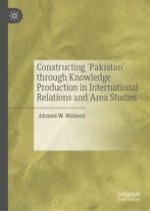
2020 | OriginalPaper | Buchkapitel
1. Introduction
verfasst von : Ahmed W. Waheed
Erschienen in: Constructing 'Pakistan' through Knowledge Production in International Relations and Area Studies
Verlag: Springer Singapore
Aktivieren Sie unsere intelligente Suche, um passende Fachinhalte oder Patente zu finden.
Wählen Sie Textabschnitte aus um mit Künstlicher Intelligenz passenden Patente zu finden. powered by
Markieren Sie Textabschnitte, um KI-gestützt weitere passende Inhalte zu finden. powered by